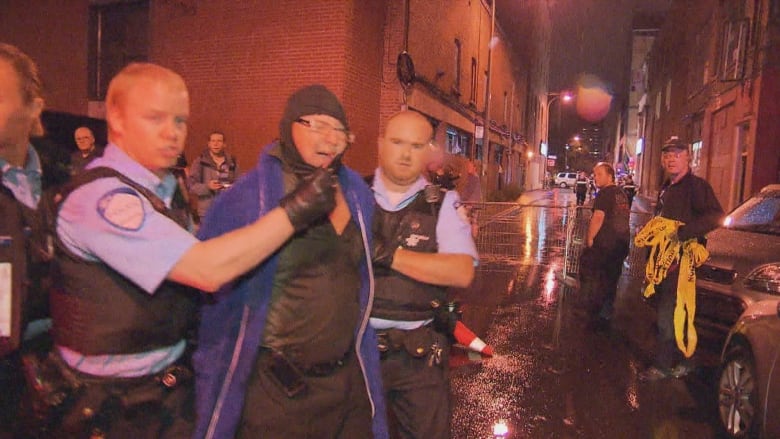The big questions in the Quebec election-night murder trial
Warning: This article includes explicit language

Did Richard Bain drive to a Quebec election-night victory party with a plan to gun down as many separatists as he could — or was he in a psychotic state, under the delusion that God had sent him there on a mission?
If the jurors determine that Bain is not criminally responsible due to a mental disorder, then that will apply to all four charges and their job will be done.
- Battle of the experts: Why a not criminally responsible verdict is unlikely
- TIMELINE: What happened on Sept. 4, 2012
Otherwise, the panel of seven women and five men will have to come to a unanimous decision in order to deliver a verdict on the charges Bain is facing: one count of first-degree murder and three counts of attempted murder.
Follow CBC News and Jaela Bernstien on Twitter for breaking developments
As the jurors wrestle with their decision, here are some of the big questions they will be weighing.
1. Is Bain's 'incriminating' note the truth?
What the jury doesn't know is that the defence tried to find a way to stop the Crown from using Richard Bain's handwritten notes as evidence.
"The statements he made .... are very incriminating. Very incriminating," defence lawyer Alan Guttman said in court when the jury wasn't present.
- Read Richard Bain's handwritten account of what happened Sept. 4, 2012
- Accused Richard Bain says he has no memory of election-night shooting
Bain claims he has no memory of the night of the shooting, but two months later he wrote a full account of the events of that night during a question and answer session with a psychiatrist.
In the seven-page note he writes: "The plan was to kill as many separatists as I could, the head, the new MPs, their leader, their backbone."
"If inside, if Madame Marois could be seen, I would have killed her."
- DOC CLOUD: Read Bain's handwritten note
Guttman failed to convince the judge that the note should only be admissible for demonstrating Bain's mental state — and not as evidence for the Crown.
In closing arguments to the jury, the prosecution argued the letter proves Bain's intent to kill, while the defence suggested the letter was a fabricated memory and the delusions of a psychotic man.
2. Was Bain psychotic or was he faking it?
Two psychiatrists — one called to testify by the Crown and one for the defence — weighed in on Bain's mental state the night of the attack at the Metropolis.
Both psychiatrists agree that Bain was angry with separatists, but the key question is what motivated that anger: Was it psychosis or his frustration with the separatists and the Parti Québécois?
The defence psychiatrist believes Bain was a "ticking time bomb" leading up to the night of the shooting, and that he believed he was carrying out God's will so could not apply his understanding of right and wrong.
But a psychiatrist called by the Crown cautioned against leaping to conclusions, and suggested Bain could be faking his amnesia and other symptoms to escape responsibility.
3. Was Bain intoxicated?

Bain has repeatedly insinuated that his actions should be blamed on pills he took before the shooting, which he said made it hard to tell right from wrong.
Whether or not Bain was intoxicated is irrelevant to his defence's main argument — their theory is that he was psychotic because of his bipolar disorder, not because of the pills.
But Guttman still tried to shake the credibility of a toxicology screen, which found no evidence of the anti-depressant Cymbalta in Bain's blood. He pointed out that the equipment was not sensitive enough to be absolutely certain.
The Crown, on the other hand, used the lack of Cymbalta in Bain's blood to suggest that Bain was lying yet again.
4. Was it an accident?

Bain told a police officer moments after the shooting "I just meant to shoot over their heads."
But two months later, in a note to a psychiatrist, Bain wrote "I was aiming to kill, I was not aiming to shoot over their heads."
Will the jury agree it was an accident, and find Bain guilty of manslaughter? Or will they believe what Bain wrote two months later, which suggests the shooting was premeditated?
The Crown asked the jury to consider the following: Does it make sense to think that Bain, an experienced hunter, would have missed by such a wide margin, shooting Denis Blanchette, standing only a few feet away, straight in the chest instead?
The defence countered — why would Bain co-operate with police, and later say "Grace of God, the gun jammed" if he'd truly been shooting to kill?
5. Does Bain hate French separatists?
WARNING: Explicit language

If Quebecers remember anything from the 2012 election-night shooting, it's Bain's infamous cry: "The English are waking up!" which he yelled in French while being led away in handcuffs.
But Bain's older brothers — David and Robert — both testified he'd never before expressed anger towards French-speaking Quebecers. In fact, they said his ex-girlfriend, who he'd spent 20 years with, and most of his friends and colleagues, were francophone.
On the other hand, the jury also heard testimony from a man who said Bain called PQ-leader Pauline Marois "f--king shit" four days before the shooting.
Plus, a psychiatrist testifying for the Crown told the court that Bain complained about a "separatist" bureaucrat who refused to grant him an ice-fishing permit, and said "I can size up people, the one who are miserable are the separatists."


